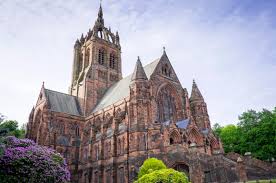
I was all of five years old. My father served on the staff of College Hill Presbyterian Church in Cincinnati. The children were not typically welcome at the worship service. That may be my fault. I am told that on one special occasion, when children were welcomed into the service, I committed a faux pas.
The congregation was reciting together the Apostles’ Creed, in a slow and stately manner. They paused briefly after affirming their belief in the Holy Ghost. Into that silence erupted my incredulous and frightened voice, “GHOST!?!?”
I don’t believe I’m the only one to be shocked at the church’s early confessions. Both the Nicene and the Apostles’ Creed affirm our belief that the church of Jesus Christ is “catholic.” Because this word has by and large fallen out of our common usage, save for as a part of “Roman Catholic” many are unaware of its meaning. Many churches seek to solve this problem by substituting for “catholic” the word “universal.” Which clues us in on what we actually mean by confessing the church is Catholic.
The world is a big place, and the church a big church. For all the divisions we might suffer from, there is a deep unity among the differing segments of the true church. The Baptists may disagree with the Presbyterians on this matter or that. But both agree that they are both a part of the one church.
This doesn’t mean, of course, that every church claiming to be a church is part of the catholic church. Deny any essential of the faith and you are not a part of the church. Which is one of the very reasons why we have creeds to begin with.
It is not, however, merely secondary doctrines that seem to separate us but do not. The catholic church also transcends national boundaries. The Dutch and the Scots are part of the catholic church. The Korean and the Nigerian are part of the one true church. We are all one body. Dividing the church runs afoul of the inspired wisdom of Paul who tells us that in Christ there is neither Jew nor Greek (Galatians 3:28).
“Roman Catholic” church then is a contradiction in terms, affirming both that it is Roman and universal. “Roman catholic” on the other hand, while still false since Rome does not affirm the gospel, is not a contradiction in affirming it is in Rome and is a part of the universal church.
Why does this matter? Read through 1 Corinthians to get a picture of the destruction wrought in the body of Christ when one part seeks to either deny or diminish another part of the church. This is no esoteric theological minutia. Rather it is an affirmation of the whole of the body that Jesus came to redeem. It means all our brothers and sisters in Christ are our brothers and sisters, and ought to be loved and served as such. Let us not fear but love the catholicity of His church.
This is the forty-eighth installment of an ongoing series of pieces here on the nature and calling of the church. Stay tuned for more. Remember also that we at Sovereign Grace Fellowship meet this Sunday June 15 at 10:30 AM at our new location, our beautiful farm at 11281 Garman Road, Spencerville, IN. Please come join us.
